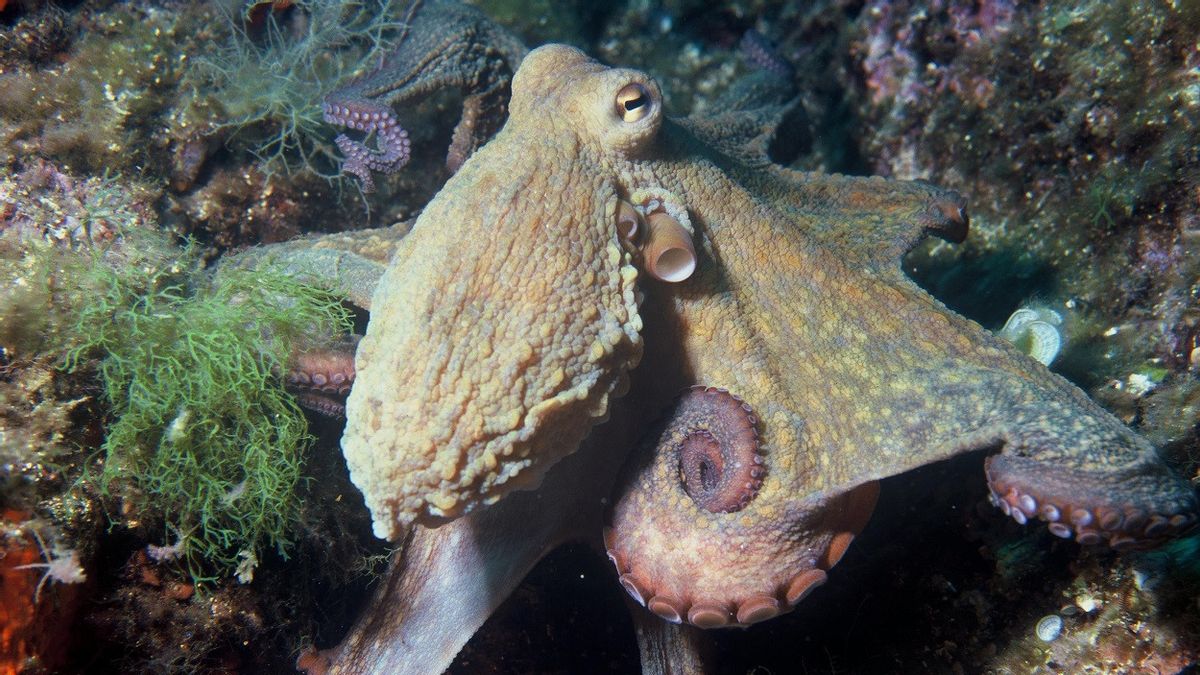JAKARTA - A number of animals such as mammals, birds and some reptile species are known to have a sleep stage called 'active' or known as REM (Rapid Eye Movement).
A new study, published March 25 in the open access journal 'iScience', sought to find out whether this "active" stage of sleep also occurs in sleeping octopuses, which is roughly different from humans.
"The motivation for studying octopuses was, to see if an animal that is very far from us, but has a very complex nervous system and very, very sophisticated behavior, whether these animals can also be sleep active," said senior author Sidarta Ribeiro, Director of the Brain Institute Federal University of Rio Grande do Norte, Brazil citing Popular Science June 26.
"We found that octopuses have two sleep states, one calm and one active, just like humans," he continued, explaining that the researchers found that octopuses also experienced an active sleep phase.

"We're right in the middle of a revolution about understanding what sleep does for us, and for organisms more generally. And that's why this paper is so important," said Marcos Frank, a neuroscientist at Washington State University in the United States who knows Ribeiro but was not involved in this study.
However, Frank has done similar research on cuttlefish. "There are clues accumulating over the last 20 years or so that sleep states similar to dream sleep in humans may occur in other organisms that evolved independently of us," he said.
Led by Sylvia Lima de Souza Medeiros, a graduate student at the Brain Institute, the research team studied four adult insular octopuses, a species that lives off the northern coast of Brazil. After capturing the animals and adjusting them to a laboratory setting, the team recorded them, using computational methods to determine what was happening under different sleep conditions.
They found a known 'calm' state, where the octopus was completely pale, almost completely motionless, with very gentle, sweet and smooth movements, eyes closed, pupils closed, Ribeiro said.
Interestingly, the team noted that every half hour, the sea creature's state seemed to change. Their eyes, arms and suckers will start to move freely. And, along with this movement, there is a shift in skin color and texture. According to him, skin color will change dramatically.

In 2019, a viral clip from a PBS documentary showed Heidi's octopus twitching, changing color and appearing to be dreaming. Scientists at the time were cautious, given the absence of data to show that octopuses have REM-like stages of sleep
In the iScience study, to show whether these octopuses are really sleeping, the researchers stimulated them with crab visuals and vibrations to measure their response. The animals' delayed response or lack of feedback indicates that they are indeed asleep during the quiet and active stages.
The authors do not know whether the octopus in this 'iScience' study is dreaming, even in humans, dreams are difficult to study. However, due to the 'active' sleep state in octopuses it usually only lasts up to a minute.
"If during these circumstances any dream occurred, it should be more like a small video clip, or even a gif," explained lead author Medeiros in a statement.
One of the limitations of the study, continued Ribeiro, was that they only studied four animals. Furthermore, the best way to measure brain activity is to use electroencephalography, or EEG, which requires the placement or temporary placement of electrodes on the head.

But that's hard to do with octopuses, whose heads are smooth and boneless, and which tend to pluck out unwanted accessories. So the team was unable to measure brain activity which could provide further confirmation of their findings. "This is also a limitation in our study," Frank said.
Whenever a trait evolves independently, like eyes or wings, "it's really interesting, because it actually tells you something about why those adaptations happened in the first place," he said.
"In terms of sleep, it's very exciting, because we don't really understand the function of sleep," he continued.
He added that the fact that this REM-like experience is also present in octopuses, Frank said, suggests that this state must be doing something important and understanding it could help unravel the mystery of why we sleep.
The English, Chinese, Japanese, Arabic, and French versions are automatically generated by the AI. So there may still be inaccuracies in translating, please always see Indonesian as our main language. (system supported by DigitalSiber.id)













